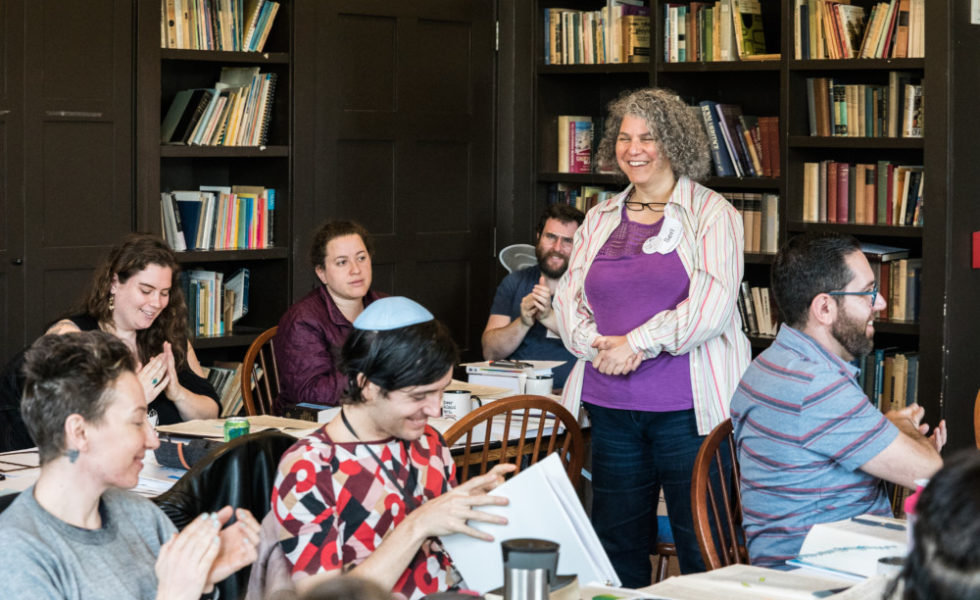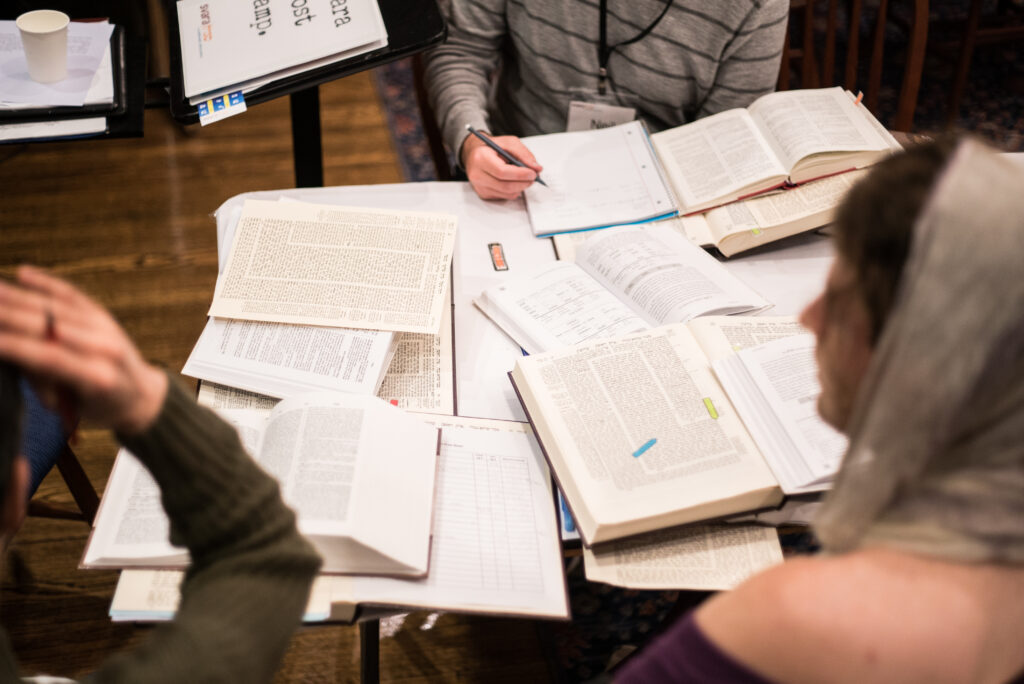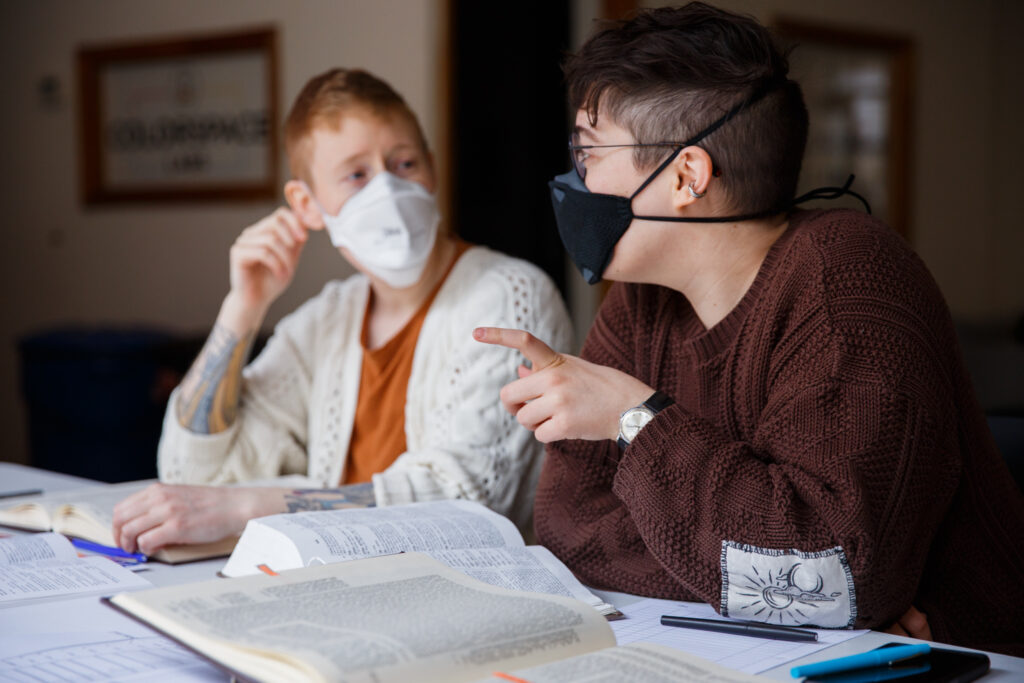Who knew that reciting a baraita—one of the bits of text in the Talmud from the Tannaim, the Rabbis of the Mishnah—from memory could be so radically transformative. First off, it’s just a baraita—a teaching conceived by our rabbinic ancestors that didn’t even make it into the Mishnah. Second, memorization and recitation were an everyday thing for the Rabbis; because they lived in an oral folk culture, a baraita recited from memory was nothing to write (or recite) home about. But once in a while, a recitation from memory can open up doors once locked, memories and feelings once repressed, wisdoms and insights not yet unearthed. Once in a while, the recitation of a baraita from memory actually transforms the way we walk in the world, as individuals and entire communities.
This is what happened in the beit midrash of Rav Nachman bar Yitzhak, a 3rd-4th century Babylonian Amora who was the head of the great yeshiva in Pumbedita. More on him and that beit midrash in a second, but jumping to the present for a moment—core to the method and message of SVARA is that there is tremendous power in the act of recitation from memory. At the same time, there are folx in our SVARA fam who we know have mixed feelings about the act of memorizing and reciting a text.
The folx in our community who are wrestling with recitations whom I’ve spoken with have talked to me about traumatic educational experiences, public shaming, the erasure of their unique learning needs and personalities, and the diminishing of their diverse gifts because they did not conform to a certain standardized system which values verbal communication above all else. For many in our community, previous experiences with public recitations and memorization as learning acts have been a quantifying practice, a tactic of consumption-culture which has been more about removing individuality than its infusion. As Sarit, SVARA Fellow and Fairy extraordinaire, once described, painfully, the art of recitation has been colonized by a capitalistic, materialistic culture. And they continued by saying, beautifully, that what we can do at SVARA is decolonize recitations by returning them to their origin as a craft of body-spirit-mind integration.
Sarit’s words touched many in our beit midrash this past zman, myself included. We were learning a sugya in Bava Metzia 55b about ona’at devarim אונאת דברים (verbal oppression) and understanding it as its own unique category both separate from, and contributing to, ona’at mamon אונאת ממון (economic oppression). Throughout the sugya, our rabbinic ancestors were trying to find a verse from the Torah to prove that verbal oppression is a real, tangible agent of harm, even though most of the Torah contexts they were able to find seemed to be more explicitly talking about economic oppression. They eventually settled on a verse, but something didn’t really feel settled; do we really need a Torah verse to tell us that oppression-with-words is a real thing? I think we all know, and have experienced, the very real effects of verbal oppression. From that point in the sugya we jumped a bit to this amazing moment:
תני תנא קמיה דרב נחמן בר יצחק
A tanna taught (a baraita) in front of Rav Nachman bar Yitzhak
This opening phrase seems simple enough, but actually the “tanna” referred to here is a lot like any student in the SVARA beit midrash today: they are the person whose special role in that moment is to recite a baraita from memory for the purpose of the Rosh Yeshiva (re: beit midrash instructor) to offer corrections on pronunciations, to help clarify the meaning of the text, and to raise questions about it! And now we get the baraita itself:
כל המלבין פני חבירו ברבים כאילו שופך דמים
Anyone who embarrasses (lit. whitens, pales) the face of their fellow in public- it is as if he has killed them (lit. spilled their blood).
This is one of the most famous Talmudic sayings in our tradition, a saying that many of us know in different versions as if by heart, such as “to embarrass someone is as if to kill them.” And the thing is, this baraita was so much more powerful and direct, a support for the real-harm-impact of verbal oppression than any of the Torah verses suggested earlier in the sugya. And just to raise one more problem—if this baraita was so well known, and especially in that culture, why didn’t the sugya just bring it in right from the get-go? The reason, I think, is because our fairy-rabbi-ancestors wanted to allow for this mic-drop moment right here:
א”ל שפיר קא אמרת דחזינא ליה דאזיל סומקא ואתי חוורא
He (Rav Nachman bar Yitzhak) said to him (the tanna): “It is beautiful what you have said, for I have seen that for him (i.e., a person who is embarrassed in public) that he goes out red and comes back pale.
Fun fact about Rav Nachman—he was famous for finding Torah verses in support of earlier tannaim (those ancestors whose work comprised the Mishnah and many baraitot). But that’s not what he does here- Rav Nachman is the head of the yeshiva, undoubtedly he already knows this baraita. But he says to the reciter “it is beautiful what you have said” and he ends up sharing his own personal experience. Maybe he’s witnessed, time and time again, the long-lasting effects of verbal harm on others, or maybe he’s not just really “asking for a friend.” The point is—there’s something about the moment of this recitation that is more powerful than citing a verse of scripture. There is something in this recitation that is beautiful or fitting for Rav Nachman that allows him to testify to a truth that lies deep within him. Who knows if we would’ve ever heard these words of Rav Nachman had not that tanna been brave enough to step up in front of the beit midrash and recite those words, from memory, imprinted in that tanna’s being.
Now before you start thinking that I’m just trying to hot-off-the-shtender-lecture-you-into-submission (hmmmm, hot…) around the value of recitations from memory, let me say this: I think it’s badass and queer-as-hell to challenge and question any and all structural norms within a system, even ours. This is how we practice in the beit midrash for the revolution we want to see in the world.
And this is where I would argue are the foundations of that revolution: time and time again, Annie, SVARA Fellow and fabulous fairy, reminded us this past zman that the true liberatory magic of the work we’re doing here happens in chazarah, the review process of the previous session’s material in the intimacy of chevruta. This review process is also where we, in the safe space of our chevruta, practice this often vulnerable art of recitation from memory. We don’t know much about this tanna in the beit midrash of Rav Nachman bar Yitzhak, but we can use our svara (moral intuition) to imagine that maybe they were nervous reciting in front of the Rosh Yeshiva. Maybe they too had a chevruta with whom they prepared the material (and historically we know this is likely). Maybe this isn’t even the entire baraita but it was all that this tanna was able to remember, and as it turned out, whether this tanna knew it or not, this recitation sparked something in Rav Nachman where instead of just relying on his usual talent of culling up Torah verses, Rav Nachman spoke from his heart, and perhaps was able to transform the words of the baraita, for all the students present in the beit midrash that day, into a call for action and compassion around the impact of words.
Returning to the present in our learning community here at SVARA, we know well the power of words. We know that words can create worlds and destroy worlds. We are the inheritors of this moment in Rav Nachman bar Yitzhak’s yeshiva and we are creating a space in which we can reclaim ourselves wholeheartedly by recognizing and being witness to each others’ experiences of verbal oppression in all of its myriads of forms, and do a damn better job of creating conscious spaces with the explicit goal of liberation from this kind of oppression. To this very day, we hold onto the power of recitation from memory because it’s not about how many words one says but about the act of standing up, being received, loved up & clapped up, and believing in the possibility of someone in that room hearing those words in a way they never heard them before. Who knows what one word amidst pauses, stumbles, stutters, staccatos or sighs from your lips will inspire in someone else? We don’t see those gesticulations or the tone of sassiness or tenderness that came from that tanna, but we can know it in each other and ourselves.
This is my hope that whether you are learning in the bet midrash at SVARA or learning with your chevruta on your own time, remember that recitation from memory is a tool for integration that is gifted to you from our queer rabbinic ancestors. It is meant to be wielded by your unique hands and spirit. It is both a tool to sharpen one’s skills and a way to practice loving presence with a chevruta, a beit midrash, and the entire world. May we all be blessed to be witness to your recitation, to be sparked by the breath-that-is-yours as it reveals new secrets within the words of our tradition again and again.







